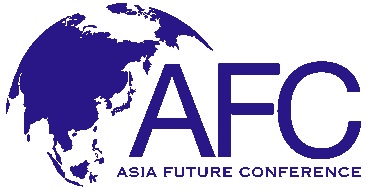About AFC
第6回アジア未来会議の総合テーマ
アジアを創る、未来へ繋ぐ―みんなの問題、みんなで解決
アジアの将来には偉大な可能性があり、世界はその発展に注目しています。過去30年に亘り、アジアは目覚ましい発展を遂げ、消費レベルは急速に上昇し、グローバルな貿易、資本、人材、イノベーションの一角を担うに至りました。次の10年の間に、アジア経済はこの地域だけでなく、グローバルな流れを決定するようになるでしょう。インターネットや技術革新から国際貿易まで、アジアは多くの分野で主要な地位を占めるようになりました。今大事なのは、アジアがいかに早く上昇するかではなく、いかに指導的役割を発揮するかです。アジアは言語、人種、宗教が様々で、政治体制も経済システムも異なりますが、歴史的な発展やその背景などを分かち合っています。
2000年にアジアのGDPは世界の1/3以下でしたが、2040年には50%を超え、世界消費の40%を占めると予測されています。経済発展は言うに及ばず、人々の寿命は延び、識字率は向上し、人間開発に役立つ技術とインターネットの普及が成し遂げられるでしょう。しかしながら、その結果起こる資源の過剰消費や健康保険の問題は深刻になると考えられます。
アジアの発展は数億人の人々を最貧困の状態から救い出しましたが、同時に貧富の格差を広げる結果となりました。都市化は経済発展に拍車をかけ、教育や公衆衛生を促進しましたが、貧困やその他の課題は手付かずでした。人口の急速な増加に伴い、多くの都市は十分な住宅の供給、インフラ、関連サービスが整備されていません。アジアの国々、或いは地域は、格差や環境問題の重圧に対処するために、より包括的かつ持続可能な経済発展を達成する必要があります。
さらに、環境や経済の持続性に加え、アジアの国々は、平和な未来を築くために共に努力することが求められています。
アジア未来会議の開催趣旨
21世紀にはいって世界全体に変革の嵐が渦巻き、人々は新しい技術に大きな期待を抱く一方、社会構造の激しい変化にとまどっています。国際化・グローバル化が唱えられて久しいのに、世界中で共有できる新しい方向性を見出すことができず、混乱は増すばかりです。このような時代においては、物事を新しい視点から複合的に分析し判断していくことが必要なのではないでしょうか。しっかりした理念を持ち、それを如何に実践していくか、一人一人の意識の改革と行動が問われているのではないでしょうか。
近年、アジアの各国は急激な経済発展を遂げていますが、地球環境問題の発生や社会経済のグローバル化の進展とともに、国境という枠組みを越えた問題が生じています。さらには、急激なグローバル化と同時に進むローカリゼーション、あるいはナショナリズムなど様々な問題が発生し、新しい課題となっています。社会の構成員である市民や組織は、個々の利益の追求と同時に、周辺社会の利益も検討しなければなりません。グローバル化に伴う様々な問題を解決するために、国境や学問領域の壁を越えた相互協力によって、物事を多面的に評価分析して問題の解決をめざしていくことが求められているのです。
アジア未来会議は、このような状況を鑑み、国際的かつ学際的なアプローチを基本として、グローバル化に伴う様々な問題を、科学技術の開発や経営分析だけでなく、環境、政治、教育、芸術、文化など、社会のあらゆる次元において多面的に検討する場を提供することを目指しています。本会議は、関口グローバル研究会(Sekiguchi Global Research Association:SGRA)が、SGRA会員だけでなく、日本留学し現在世界各地の大学等で教鞭をとっていらっしゃる方々、その学生の皆さん、そしてどなたでも日本に興味のある方々が一同に集まり、知識・情報・意見・文化等の交流・発表の場を提供するために、趣旨に賛同してくださる諸機関のご支援とご協力を得て開催するものです。
関口グローバル研究会は、公益財団法人渥美国際交流財団の一部署で、2000年7月に東京で設立されました。世界各国から渡日し長い留学生活を経て日本の大学院から博士号を取得した知日派外国人研究者が中心となって活動し、グローバル化に関わる問題提起を行い、その成果をフォーラム、レポート、ホームページ等の方法で、広く社会に発信しています。ある一定分野の専門家ではなく、広く社会全般を対象に、幅広い研究領域を包括した国際的かつ学際的な活動を狙いとしています。良き地球市民の実現に貢献することがSGRAの基本的な目標です。
この趣旨に賛同してくださった諸機関のご支援とご協力を得て第1回アジア未来会議は2013年にタイのバンコクで、第2回アジア未来会議は2014年にインドネシアのバリ島で、第3回アジア未来会議は2016年に北九州市で開催され、第4回アジア未来会議は2018年8月に韓国ソウル市で、第5回アジア未来会議はフリピンのアラバン、ロスバニョスで開催され、熱気あふれる研究発表と交流が行われました。
今回台北で開催される第6回アジア未来会議でも、アジア・地球社会の未来に向けた議論が展開されることを願っております。皆様の積極的なご参加をお待ちしています。
About the Theme
BUILDING A FUTURE ASIA — Solving Problems, Together
The future of Asia holds great potential, and the world is paying attention to the development of the region. Over the past 30 years, Asia has achieved remarkable progress, with rapidly rising consumption levels and successful integration into global trade, capital, talent and innovation flows. In the decades to come, Asian economies will not only participate in but also determine the direction of these flows. From the Internet and technology to international trade, Asia has long become a main player in many fields. The key issue today is no longer how fast Asia is rising, but what forms of leadership it will generate. Although Asian countries contain diverse languages, races and religions and have different forms of government and economic systems, they share similar development histories and backgrounds.
Asia accounted for less than 1/3 of the world’s total GDP in the year 2000 but is expected to exceed 50% of it by 2040. By then, Asia is also expected to account for 40% of total world consumption. Asia has not only achieved economic progress but human development through increased human longevity and literacy rates as well as the rapid spread of technology and the Internet. As a result of this, however, over-used resources and health insurance have become urgent social issues.
The rise of Asia has not only lifted hundreds of millions of people out of extreme poverty, but has also widened the gap between the rich and the poor. Urbanization is driving economic development and improving education and public health services, but poverty and other development challenges remain. With rapid population growth many cities are unable to provide adequate housing, infrastructure and other related services. Asian countries and regions need to achieve more inclusive and sustainable economic growth in order to cope with the pressures of inequality and environmental issues. In addition to environmental and economic sustainability, Asian countries should also work together for Asia’s future toward peace.
About the Asia Future Conference
The twenty-first century has seen the world thrust into a maelstrom of change and unpredictability. We remain hopeful in the face of rapid technological advancements, but many of us struggle to regain our bearings as longstanding social structures become upended. Internationalization and globalization have long been heralded as the keys for the future, yet a truly global path forward remains elusive, serving only to heighten the sense of uncertainty. As global citizens in this era of change, we are called anew to reexamine our world and our collective future and to seek new multidimensional and inclusive perspectives on myriad global issues.
The achievement of rapid economic development has also led to dramatic changes in Asia. With the onset of global environmental issues and an increasingly globalized social economy, problems that transcend national barriers are on the rise. Amidst rapid globalization there is a simultaneous process of localization, leading to problems such as nationalism taking root. The citizens and groups that make up society must think not only about the pursuit of individual wealth, but of the benefits for the rest of society. In order to solve the problems brought about by globalization, it is necessary to cross and cooperate across national and disciplinary borders, and to analyze issues from a multidimensional perspective.
The Asia Future Conference was established with this reality in mind. International and interdisciplinary at its core, the Asia Future Conference encourages diverse approaches to global issues that are mindful of the advancement of science, technology and business and also take into consideration issues of the environment, politics, education, the arts, and culture. The Asia Future Conference is organized by the Sekiguchi Global Research Association (SGRA) in partnership with likeminded institutions, and provides a venue for the exchange of knowledge, information, ideas, and culture not only for SGRA members, but also for former foreign students of Japan from educational institutions around the world, their own students and collaborators, and anyone interested in Japan.
SGRA began operating in Tokyo in July 2000 as a division of the Atsumi International Foundation, a charitable organization. At its core is a community of non-Japanese researchers who come from all over the world to conduct advanced studies in Japan and obtain doctoral degrees from Japanese graduate institutions. SGRA identifies issues related to globalization and seeks to disseminate research results to a wide audience through forums, reports, and the internet. SGRA’s aim is to reach society at large rather than a specific group of specialists through wide-ranging research activities that are inherently interdisciplinary and international. The essential objective of SGRA is to contribute to the realization of responsible global citizens.
Garnering the support and cooperation of various like-minded institutions, the 1st AFC was held in March 2013 in Bangkok, Thailand, the 2nd in August 2014 in Bali, Indonesia, the 3rd in September 2016 in Kita Kyushu City and the 4th in August 2018 in Seoul, South Korea. The 5th AFC was most recently held in Manila, the Philippines, in January 2020. All of the conferences were made memorable by the many passionate presentations as well as fruitful exchanges that took place. The 6th AFC will be held in Taipei, Taiwan in August 2021. We look forward to welcoming a diverse and dynamic group of conference participants.
第6屆亞洲未來會議的中心議題
創造亞洲 迎向未來―大家的問題、大家來解決
亞洲的未來具有極大的潛力,世界正在關注著她的發展。在過去的30年中,亞洲有著顯著發展,消費水平迅速提高,已在全球貿易、資本、人材、創新等各方面展露頭角。在未來十年中,亞洲經濟不僅限於亞洲,甚至將會影響全球。從網際網路、技術革新到國際貿易,亞洲已成為許多領域的主導者。此時,重要的不是自豪亞洲崛起的速度,而是要思考亞洲如何發揮領導作用。亞洲的語言,種族和宗教各異,政治和經濟體系也不盡相同,但卻擁有相關連的歷史發展和背景。
亞洲的GDP在2000年還不到世界的三分之一,但預計在2040年將超過二分之一,並佔世界消費的40%。經濟發展無庸置疑,人們的壽命將得以延長,識字率不斷提高,以及網際網路的普及,將有助於人類的發展。然而,時代進步所造成的資源過度消費和健康保險問題也將更嚴重。
亞洲的發展使數億萬人民擺脫了貧困,但與此同時,貧富差距也在擴大。城鎮化刺激了經濟發展,促進了教育和公共衛生,而貧困和其他議題卻毫無進展。隨著人口的快速增長,許多城市沒有足夠的住宅,基礎設施,相關服務並未完備。亞洲國家或地區面臨不平等和環境問題的壓力,因此我們需要實現更具包容性和可持續性的經濟發展。此外,除了環境和經濟的可持續性,亞洲國家還將共同努力建構一個和平的未來。
亞洲未來會議的開催趣旨
21世紀,求新求變的風潮席捲全球,人們對新技術寄予厚望,同時對社會結構所發生的巨大變化感到焦慮。儘管人們長期以來一直提倡國際化和全球化,但為能找出共識,徒增混亂。在這樣的時代,我們有必要以多面向且從全新的角度分析和判斷事物。最重要的是,我們要有明確的理念,並付諸實踐,有創新的思維以及起而行的作為。
近年來,亞洲各國的經濟發展迅速,但是,隨著全球環境問題的出現和社會經濟全球化的發展,出現了跨越國界的問題。另外,全球化急遽進展的同時,也出現了在地化或民族主義的等各種現象,進而衍變成新的課題。社會成員的公民和組織在追求各自利益的同時,也須考慮其周邊的社會利益。我們必須跨越國界和超越學科,相互配合,從各個方面評估和分析事物,致力解決全球化所產生的各種問題。
鑑於上述情況,亞洲未來會議旨在提供各國學者一個多元的交流平台,在此可以國際化和跨學科方法為基礎,不僅限於科學技術的開發及商業分析,亦可從環境、政治、教育、藝術、文化等,社會的各個層面探討全球化所面臨的問題。本會議是在認同本會宗旨的各機關組織的支援協助之下,由關口全球研究會(Sekiguchi Global Research Association:SGRA)主辦,提供SGRA會員、在世界各大學任教的留日學者、在學研究生、對於日本有興趣的人士,進行知識・資訊・意見・文化等交流、發表的學術會議。
關口全球研究會於2000年7月在東京成立,屬於公益財團法人渥美國際交流財團的一部分。本研究會是以在日本取得博士學位的世界各國知日派學者為中心所組成,針對全球化的議題進行研究,並將其成果以論壇、書面報告或以刊載於網頁等方式,向社會廣泛傳播。我們的目標是涵蓋廣泛研究領域的國際性和跨學科活動,對象是廣泛的社會民眾,而不是某個領域的專家。實現良好全球公民,世界做出貢獻是SGRA的基本目標。
在贊同本理念的各機關組織的支持與合作下,亞洲未來會議第1屆於2013年在泰國曼谷舉行,第2屆於2014年在印度尼西亞巴厘島舉行。第3屆於2016年在北九州市舉行,第4屆於2018年8月在韓國首爾舉行,第5屆在菲律賓阿拉邦和洛斯巴諾斯舉行。每屆的研究報告和交流皆相當熱烈充實。
我們希望這次在台北舉行的第6屆亞洲未來會議也將針對亞洲和全球社會的未來進行熱烈的討論。我們期待您的積極參與。



